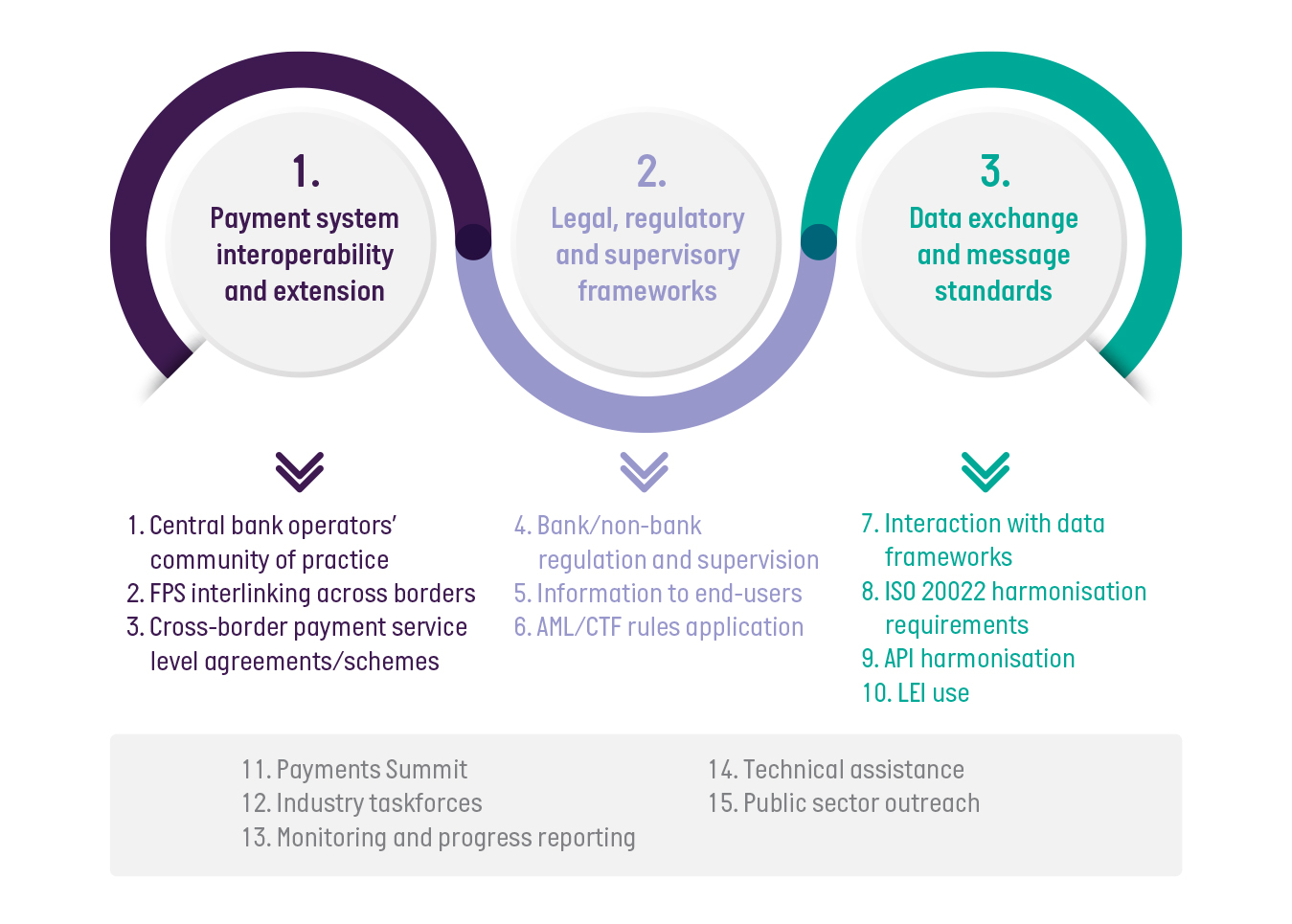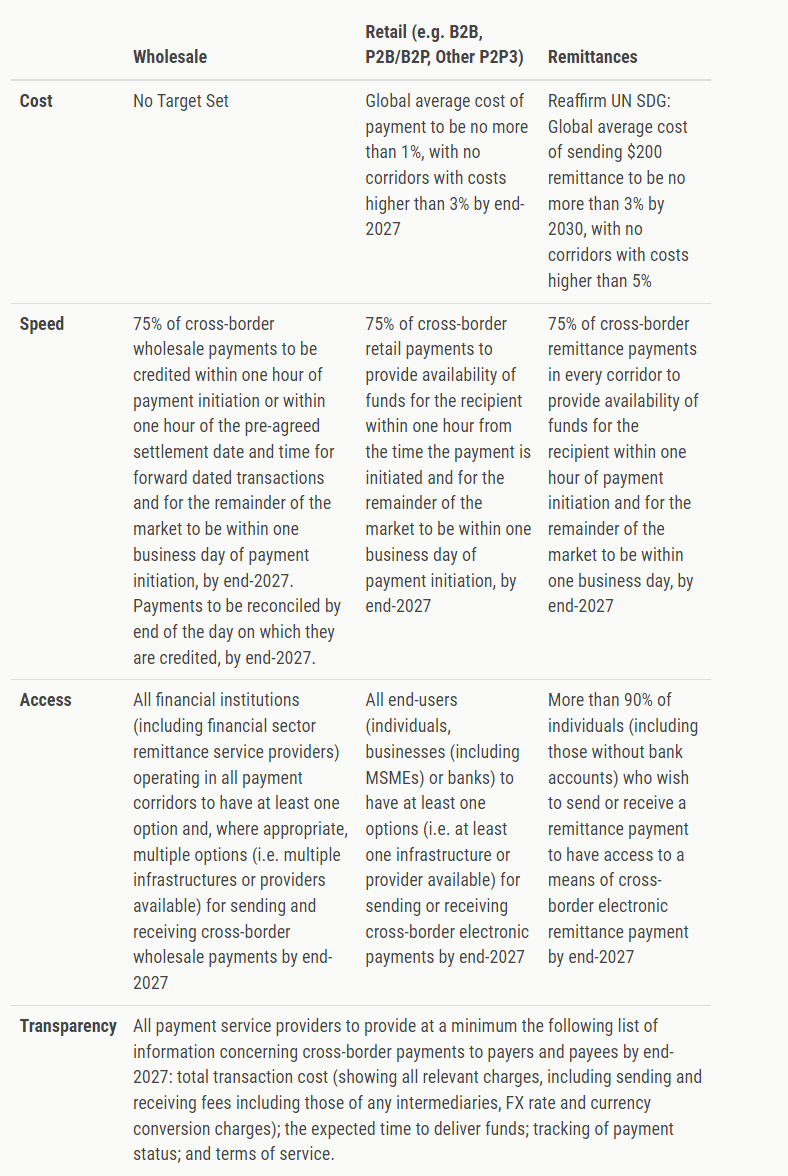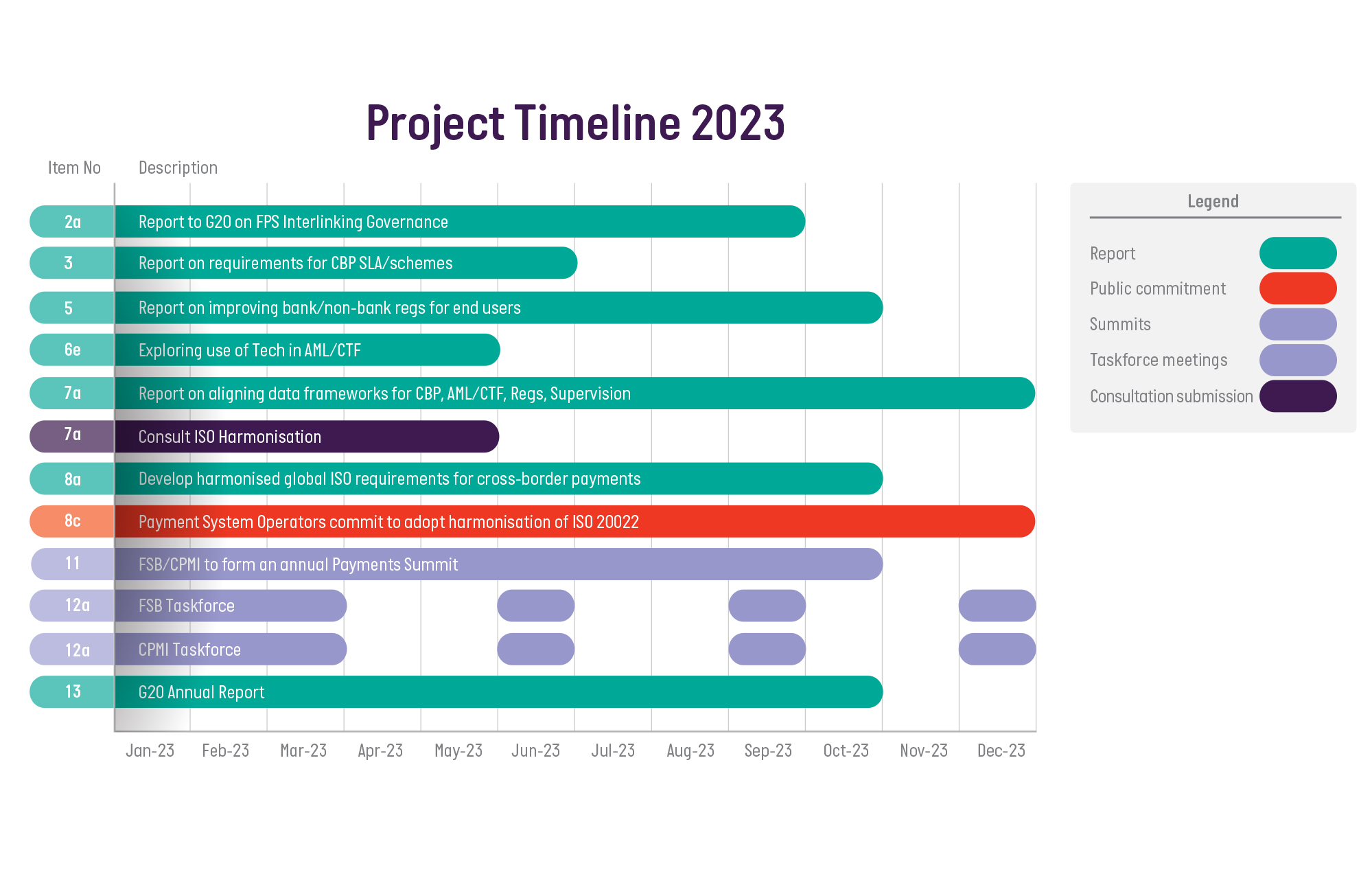Cross-Border Payments Round-Up - November 2023
Welcome
Welcome to the fourth Cross-Border Payments Round-Up, a biannual newsletter sharing updates on the progress of the global roadmap for enhancing cross-border payments.
The FSB - having reached an inflection point after two years of stocktakes, consultations and analyses - has comprehensively refocussed their roadmap efforts on enhancing cross-border payments. The FSB has set its sights on achieving the 2027 targets.
To actualise this, the FSB published its G20 Roadmap for Enhancing Cross-Border Payments: Priority actions for achieving the G20 targets in March 2023. This is a comprehensive refocusing of the original Roadmap from 2021 and assigns 10 action items across the three priority themes, underpinned by five further generic actions. This approach was endorsed by the G20 Finance Ministers and Central Bank Governors Meeting in Bengaluru, India in February 2023. These actions are set out in the diagram below and were endorsed by the G20 New Delhi Leaders’ Declaration in September 2023.

Source: FSB
What remains constant, though, are the targets for addressing the four challenges of cross-border payments, which the G20 has agreed with the FSB – speed, cost, transparency and access – set out in Appendix 1. However, there has been a significant change to the definitions of 'wholesale' and 'retail payments'. The FSB has assigned a value threshold of US$100,000 or greater as being a 'wholesale payment'. 'Retail payments' have been assigned a value threshold of less than US$100,000 but greater than US$200, with the 'remittance payment' threshold remaining at US$200 or below.
Cross-Border Payments Advisory Council (CBPAC)
AusPayNet’s CBPAC continues to support and coordinate industry activities that will be key to successfully implementing the roadmap and domestic cross-border payment priorities.
Priority Theme Progress
Payment System Interoperability and Extension
Fast Payment Systems (FPS) have garnered much interest in recent years and their prevalence has been growing, with over 60 jurisdictions now having launched an FPS. The dynamism of the Asia-Pacific region is self-evident, not just because of the prevalence of FPS in the region, but because of their extensive interlinking that enables faster, cheaper, accessible and transparent cross-border payments. Nonetheless, interlinking FPS is not without its challenges, particularly with respect to governance and oversight, as noted by CPMI in its Interim Report to the G20: Linking fast payment systems across borders: considerations for governance and oversight.
The RBA, too, is continuing its study on interlinking fast payment systems for cross-border payments with engagement from industry and other stakeholders. This study is looking at the issues involved in potentially interlinking the NPP to other fast payments systems over a medium-term horizon.
Traditional correspondent banking is also improving, with Swift reporting that 89% of cross-border payments are processed over the Swift network within one hour. It does indicate, though, that there is much more to be done by industry in delivering the funds to customer accounts within one hour. With 84% of all payments on the Swift network processed directly or with a single intermediary, the possibility of reaching the G20 targets seems tantalisingly close.
Legal, Regulatory and Supervisory Frameworks
The Financial Action Task Force (FATF) has established a Private Sector Consultative Forum, which met in Vienna, Austria on 8-9 May 2023. The FATF is continuing its analysis on Recommendation 16: Wire Transfers, with a view to reconvening in late 2023 with stakeholders. The FATF is scheduled to publish its enhancements to Recommendation 16 in February 2024.
Cross-Border Data Exchange and Message Standards
The transfer of data across borders is integral to the smooth functioning of cross-border payments. This data flow is governed by numerous data frameworks, such as laws, rules, regulatory requirements that govern areas such as collection, storage and management of data that underpins cross-border payments. In September 2023, the FSB completed their Stocktake of International Data Standards Relevant to Cross-Border Payments.
This stocktake has illuminated areas for improvement, namely:
- AML/CTF requirements
- Cooperation on data privacy issues
- Alignments and interoperability of technical standards
- Data framework and innovation, including digital identity and open banking
- Broader alignment and interoperability between data frameworks.
The FSB notes that the next phase is to identify recommendations, in cooperation with stakeholders and with public consultation, to address the impediments identified in their stocktake. It should also be noted that some frictions may be legitimate and necessary consequences to achieving other public policy objectives.
Legal Entity Identifiers (LEIs) continue to be an area of focus for the FSB (in particular, stimulating their use in cross-border payments). The LEI, too, is evolving. Read our blog by Business Analyst, David O'Mahony, to discover the latest evolution from GLEIF on the LEI.
The Bank for International Settlements’ Committee on Payments and Market Infrastructures (CPMI) published their Final Report: Harmonised ISO 20022 data requirements for enhancing cross-border payments. The CPMI encourages payment system operators and participants to implement practices that support consistent formatting and transmittal of payment messages.
The RBA and AusPayNet welcome the BIS CPMI harmonised ISO 20022 data requirements for cross-border payments and will align its ISO 20022 message usage guidelines by the end of 2027.
CPMI recently established an API Panel of Experts (CPMI APEX). The panel will evaluate proposals for API standards in cross-border payment information exchange, develop recommendations for greater harmonisation of APIs, and develop a longer-term global governance proposal and process. We are pleased that Australia has a representative on this important panel. We will expect more details in the near future, given that the first meeting was in September 2023.
Generic Underpinning Actions
As part of the Industry Taskforces action item, both CPMI and the FSB have established new taskforces to assist them in taking forward the G20 Roadmap for Enhancing Cross-Border Payments.
CPMI has established the Payments Interoperability and Extension (PIE) Taskforce. This has brought together firms that offer cross-border payment services, payment system operators, and relevant industry associations.
The PIE Taskforce has had two meetings. Agenda and meeting artefacts have been published by CPMI and are available here. In essence, discussions were had on ISO 20022 harmonisation, an update on the FSB's key performance indicators measuring progress towards the targets, and discussions on practical actions to enhance cross-border payments.
FSB has established the Legal, Regulatory, and Supervisory Matters (LRS) Taskforce. This has brought together firms that offer cross-border payment services, payment system operators, and relevant industry associations with significant experience and responsibilities in compliance, legal, risk management, and cross-border payment operations.
The LRS Taskforce will provide input and feedback on frictions in legal, regulatory or supervisory frameworks related to the provision of cross-border payments and relevant data-related frameworks.
The LRS Taskforce has had one meeting. Agenda and meeting artefacts have been published by the FSB and are available here. In summary, discussions were had on fostering a level playing field among participants by promoting more convergence and clarity around supervisory matters, as well as AML/CTF issues. They also discussed opportunities around increasing standardisation of data requirements and agreed that areas of focus for the Taskforce would be driven by the deliverables of the FSB.
Monitoring and reporting are an important in improving cross-border payments. To that end, the FSB has published its Annual Progress Report on Meeting the Targets for Cross-Border Payments. This set of global Key Performance Indicators shows more work needs to be done to achieve the targets, but also notes that global KPIs cannot provide the whole story of diverse and complex payment systems. This issue was recognised by CBPAC several years ago, as it started its journey on benchmarking. When reviewing the FSB's KPIs, Australia is within East Asia and Pacific.
Taking the Roadmap Forward
Work continues in other areas that may support ongoing evolution on cross-border payments. In particular, Project Mandala explores the feasibility of encoding jurisdiction-specific policy and regulatory requirements into a common protocol for cross-border use cases, such as foreign direct investment, borrowing, and payments. Project Mandala is a proof-of-concept run by BISIH Singapore Centre, the RBA, the Bank of Korea (BOK), the Central Bank of Malaysia (BNM), and the Monetary Authority of Singapore (MAS), in collaboration with financial institutions, and seeks to ease the policy and regulatory compliance burden by automating compliance procedures, providing real-time transaction monitoring, and increasing transparency and visibility around country-specific policies. In doing so, it aims to address key challenges identified during Project Dunbar, which developed an experimental multiple central bank digital currency (mCBDC) platform.
Work also continues on Project Polaris by the BIS Innovation Hub, with the recent release of Part 4: A high-level design guide for offline payments with CBDC. For further reference, BIS Innovation Hub projects are catalogued here and cover a range of investigatory experiments in CBDCs, stablecoins, compliance, AML and APIs, much of which may have utility for improving cross-border payments.
The G20 New Delhi Leaders’ Declaration reaffirmed their commitment to the effective implementation of the prioritised actions for the next phase of the G20 Roadmap for Enhancing Cross-Border Payments to achieve the global targets for faster, cheaper, transparent and inclusive cross-border payments by 2027. The G20 Finance Ministers and Central Bank Governors Meeting in Marrakesh also fully endorsed the roadmap in their Communique.
CPMI and FSB Milestones for 2023
Appendix 1




